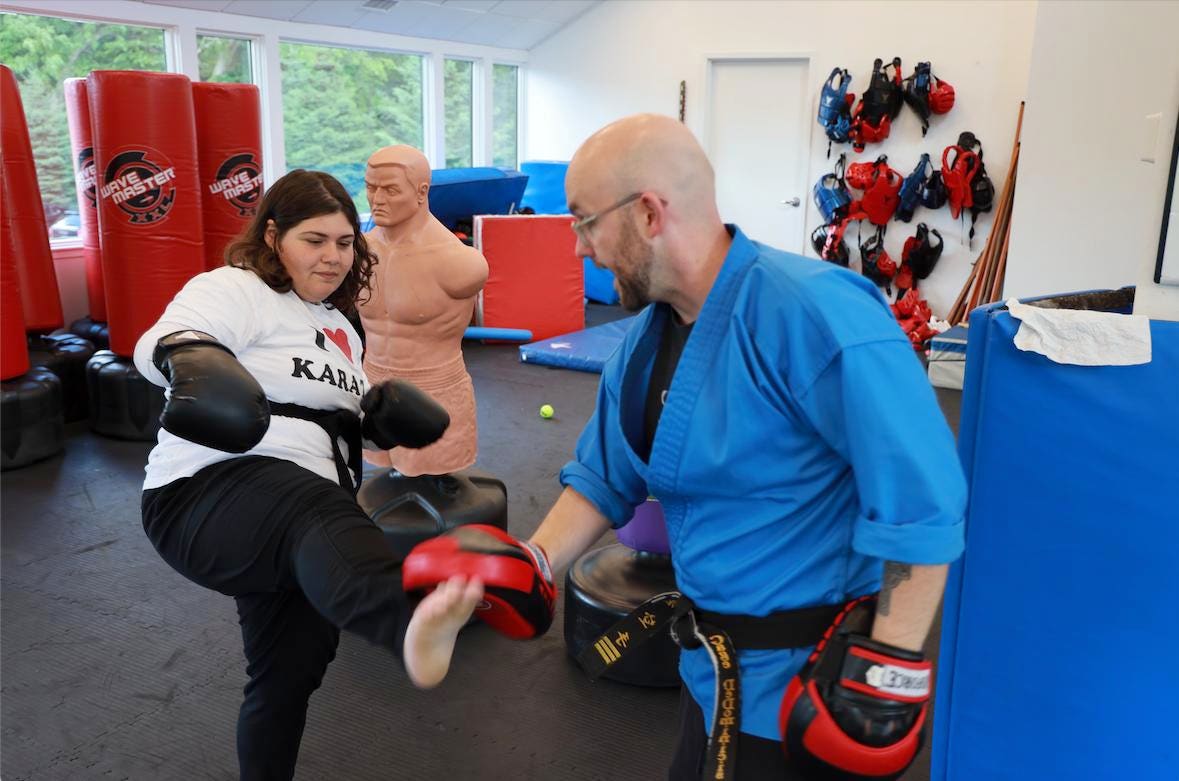Kibu students learn karate through Tool’s unique and innovative platform.
Courtesy of Colby Barnett
People with disabilities are the largest minority group in the United States, with over 60 million people, yet they are underrepresented. For example, 81% of people with disabilities feel unwelcome in fitness facilities, exacerbated by a lack of access to adaptive options. And 80% of people with disabilities believe that basic financial literacy skills essential for daily life are not covered in existing training programs.
Both government agencies and private organizations are turning to creative collaborations to address this gap.
The road to partnership
The U.S. Department of Education’s Rehabilitation Services Administration (RSA) launched Pathways to Partnership, which will provide approximately $199 million in funding for several innovative collaborative partnerships between state vocational rehabilitation agencies, state and local education agencies, and federally funded independent living centers to help people with disabilities transition smoothly to life after high school. The primary goal is to prepare young people with disabilities for independent living, competitive integrated employment, and integration into the community.
Launching in September 2023, Pathways to Partnership is the largest discretionary grant ever administered by the RSA.
Abilis and Kibu: Teaching life skills through online apps
One example of a creative partnership in action is Abilis and Kibu, who have teamed up to provide a fun, hands-on way to teach life skills to people with disabilities. The Abilis-Kibu partnership leverages each organization’s strengths to amplify the impact of both.
Abilis is a non-profit disability services provider serving over 800 people with disabilities and their families from birth to the end of their lives in Fairfield County, Connecticut. As part of our services, we offer therapeutic services, day programs, transitional programs, employment programs, activities, and residential programs for all ages. We are also licensed to provide autism specific diagnostic and intensive early intervention for children under the age of 3.
Kibu is the brainchild of Daniel Caridi and Gage DeDominicis, who took their passion for volunteering teaching free fitness classes for people with special needs and turned it into an online life skills and fitness platform for people with disabilities. Kibu provides high-quality educational content to Abilis’ 800 members through the Kibu platform.
Amy Montimuro, CEO and President of Abilis, Inc. had this to say about the creative collaboration: “Abilis community members of all ages, abilities and disabilities are active participants in Kibu fitness programs and frequently appear in our videos,” adding, “Not only can Abilis program participants take classes from anywhere (Abilis or at home on their TV, tablet or phone), our community members love seeing themselves on the big screen and we’re proud to be part of a program that’s viewed and utilized around the world.”
The Kibu platform also offers life skills classes to help people with disabilities like Kieran McGuire. McGuire learned how to grocery shop, use a debit card, use a microwave and even how to vote on the Kibu platform. Kibu helped McGuire use the skills he learned to get his first job.
McGuire talks about the job skills he learned from Kivu: “At work, it made me feel more comfortable interacting with everyone who works at Mike’s Organic and with our customers. Kivu helped me believe I could do this job and made me a more productive person with a bigger future.”
Kibu students can work part-time confidently and successfully.
Courtesy of Donald Maguire
Kibu’s founders are keen to forge strategic partnerships to create win-win solutions like the one they did with Abilis. “By partnering with disability support providers like Abilis, we can find new ways to help people with disabilities feel more confident, excel at work, and live healthier, more active lives,” said Caridi.
DBS DBS and SG make it happen: Financial literacy for all
Singapore’s DBS Foundation and SG Enable are another example of a creative collaboration to help people with disabilities acquire life skills. The partnership is touted to be the first of its kind, with both parties aiming to equip 6,500 people with disabilities and their caregivers with financial and digital literacy skills.
DBS is a leading bank in Asia, while SG Enable is Singapore’s not-for-profit focal point for disability and inclusion, established by the Ministry of Social and Family Development in 2013. As part of the partnership, DBS Foundation has donated S$1 million towards the flagship initiative.
DBS Foundation and SG Enable have leveraged their respective areas of expertise to jointly develop customised learning roadmaps that cater to diverse learning needs, including support for various disability profiles such as autism, intellectual disabilities, physical disabilities and sensory impairments. The learning roadmaps cover a wide range of topics, from basic financial concepts such as budgeting, money management and insurance to how to apply these concepts in the digital world through topics such as digital banking, online security and fraud awareness.
In addition to providing funding, DBS Bank is providing expertise in financial and digital literacy skills, and mobilizing employee volunteers to help people with disabilities gain these skills to face the future with confidence.
Conclusion
The bottom line? Creative collaboration has tangible benefits for people with disabilities. How tangible? Connecticut Innovation, the venture capital arm of the state of Connecticut, used the Kibu platform to survey 100 people within the Abilis community to find out. The results were impressive.
– There was a 22% increase in the number of participants who were more interested in working.
– A 16% increase in the number of participants in full-time jobs or internships.
– Participants’ independence increased by 19% (measured by the types of prompts they needed in their jobs/internships and in Kibu classes).

